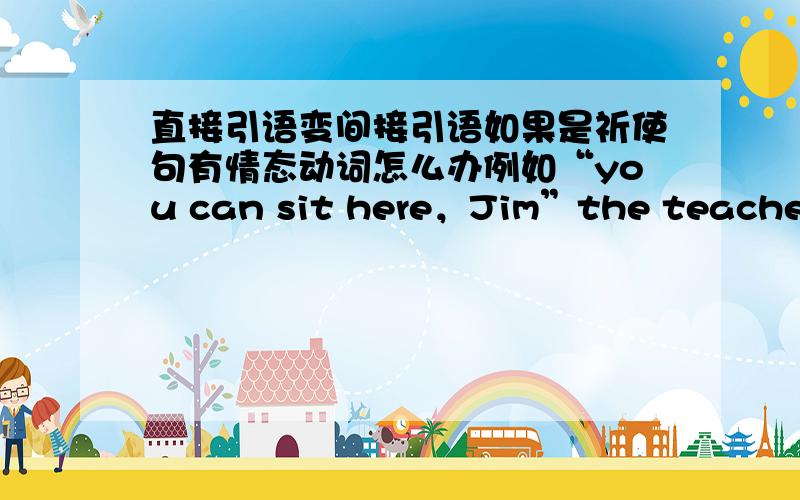直接引语变间接引语如果是祈使句有情态动词怎么办例如“you can sit here,Jim”the teacher said“you must come here before five”the boss said就是想问问那个像must,can,should是不是可以去掉,如果不去掉
来源:学生作业帮助网 编辑:作业帮 时间:2024/11/25 03:25:03

直接引语变间接引语如果是祈使句有情态动词怎么办例如“you can sit here,Jim”the teacher said“you must come here before five”the boss said就是想问问那个像must,can,should是不是可以去掉,如果不去掉
直接引语变间接引语如果是祈使句有情态动词怎么办
例如“you can sit here,Jim”the teacher said
“you must come here before five”the boss said
就是想问问那个像must,can,should是不是可以去掉,如果不去掉,又该怎么变
直接引语变间接引语如果是祈使句有情态动词怎么办例如“you can sit here,Jim”the teacher said“you must come here before five”the boss said就是想问问那个像must,can,should是不是可以去掉,如果不去掉
可以去掉.所谓祈使句,就是表示命令或请求的句子.转换成间接引语时,可以使用to do来解决.
The teacher allowed me to sit there.
The boss ordered me to go there before five.
1.当直接引语中有情态动词should, would, could, had better, would rather, might, must, ought to, used to, need时,如:
The doctor said, “You'd better drink plenty of water.” ——>
The doctor said I'd bett...
全部展开
1.当直接引语中有情态动词should, would, could, had better, would rather, might, must, ought to, used to, need时,如:
The doctor said, “You'd better drink plenty of water.” ——>
The doctor said I'd better drink plenty of water.
He said, “She must be a teacher.”——> He said that she must be a teacher.
He said, “She ought to have arrived her office by now.”——>
He said that she ought to have arrived her office by then.
The teacher said, “You needn't hand in your compositions today.”——>
The teacher said we needn't/didn't need to/didn't have to hand in our compositions.
She asked, “Must I take the medicine?”——> She asked if she had to take the medicine.
2. ⑤如果直接引语中的情态动词没有过去时的形式(例:ought to, had better, used to)和已经是过去时的形式时,(例:could, should, would, might)不再变。如:
Peter said. "You had better come have today。" →Peter said I had better go there that day。
收起